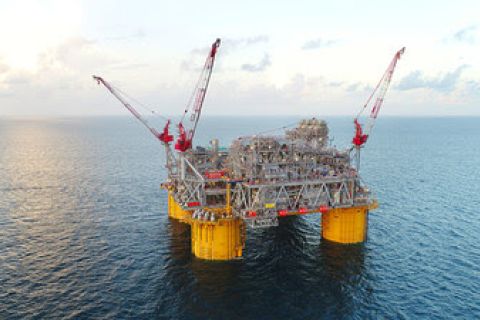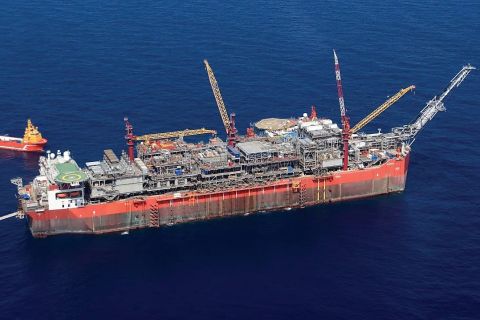ExxonMobil Corp. and Apache Corp. (NYSE: APA) plan a North American joint venture on prospective and mature properties in West Texas, Western Canada, onshore Louisiana and the Gulf of Mexico shelf. "This allows us to create more shareholder value from mature producing properties and large undeveloped acreage positions, and gives us access to new deep gas prospects in Louisiana both on and offshore," says Harry J. Longwell, ExxonMobil director and executive vice president. Apache will pay $385 million in cash as part of the deal. ExxonMobil agreed to transfer its interests in 28 mature producing oil and gas fields in West Texas and New Mexico with current gross production of about 10,000 BOE per day. The major will retain a revenue interest indexed to oil price through 2009, as well as a 50% working interest in all properties beneath the currently producing intervals. In Alberta, ExxonMobil Canada Energy will farm out its interest in approximately 300,000 acres of undeveloped property interests in mature areas to Apache Canada Ltd. Apache will drill and operate more than 250 wells over an initial two-year period with upside for further drilling. ExxonMobil Canada will retain a 37.5% lessor royalty on fee lands and 35% of its working interest on ExxonMobil leasehold as to any production resulting from the drilling program. Onshore Louisiana and on the Gulf of Mexico shelf, the parties will jointly explore for deep gas on more than 800,000 acres of Apache properties for an initial period of five years. To expedite exploration, the agreement provides flexibility on participation and operatorship. ExxonMobil will operate high-cost, deep-gas prospects that rely on state-of-the-art technology, and Apache may pursue and operate shallower prospects. Paul Y. Cheng, an analyst with Lehman Brothers, views the transaction as a positive for ExxonMobil, and thinks it could serve as a model for other majors to maximize value in mature basins. "ExxonMobil appears to have received good value for their producing properties," Cheng says. "In addition to a cash payment of $385 million, representing $6.42/BOE of proven reserves, ExxonMobil will receive options to share future upside from current producing properties as well as future development opportunities." Also, Cheng adds, by farming out its Canadian acreage position, ExxonMobil will enable a higher utilization rate of those assets while reducing its capital commitment. "Finally, by farming into Apache's deep shelf gas prospects, ExxonMobil could further strengthen its position in this emerging new play," he concludes. In the Gulf of Mexico, Cheng does not expect this deal to greatly accelerate ExxonMobil's planned drilling program. "Although this new alliance may potentially lead to a slightly more active drilling program, [ExxonMobil] management thinks that any increase will be relatively modest...this new alliance may increase the Gulf of Mexico drilling program at most by an additional one or two wells per year." Rehan Rashid, an analyst with Friedman Billings Ramsey, praised the deal from Apache's point of view. The agreement adds nearly 4% to existing reserves at an attractive acquisition cost, enables Apache to begin to monetize the deep shelf potential of its Gulf assets, and provides access to a substantial undeveloped acreage position in mature areas of North America, Rashid says. "In our opinion, the true benefit of the transaction is the opportunity for Apache to monetize its interest in deep shelf Gulf of Mexico assets. With ExxonMobil's technical expertise, Apache should be able to kick-start an exploration program that could provide meaningful reserve and production exposure." In addition, the access to 300,000 undeveloped acres in Canada and the receipt of 63.3 million BOE of Permian Basin proved reserves at a cost of $6.08 per BOE, deepen the company's reinvestment opportunities, he says.
Recommended Reading
TotalEnergies Starts Production at Akpo West Offshore Nigeria
2024-02-07 - Subsea tieback expected to add 14,000 bbl/d of condensate by mid-year, and up to 4 MMcm/d of gas by 2028.
Well Logging Could Get a Makeover
2024-02-27 - Aramco’s KASHF robot, expected to deploy in 2025, will be able to operate in both vertical and horizontal segments of wellbores.
Shell Brings Deepwater Rydberg Subsea Tieback Onstream
2024-02-23 - The two-well Gulf of Mexico development will send 16,000 boe/d at peak rates to the Appomattox production semisubmersible.
E&P Highlights: Feb. 26, 2024
2024-02-26 - Here’s a roundup of the latest E&P headlines, including interest in some projects changing hands and new contract awards.
Remotely Controlled Well Completion Carried Out at SNEPCo’s Bonga Field
2024-02-27 - Optime Subsea, which supplied the operation’s remotely operated controls system, says its technology reduces equipment from transportation lists and reduces operation time.





